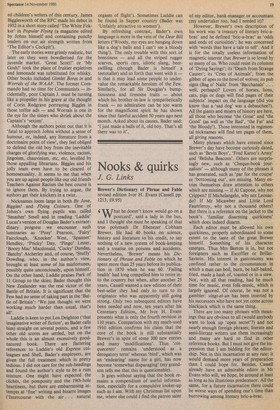Nooks & quirks
J. G. Links
Brewer's Dictionary of Phrase and Fable revised edition Ivor H. Evans (Cassell pp. 1213, £9.95) C What he doesn't know would go on a postcard', said a lady in the bus, and 1 thought she must be speaking of that true polymath Dr Ebenezer Cobham Brewer. He had 40 books on science, history and literature to his credit, to say nothing of a new system of book-keeping and a treatise on poisons and accidents. Nevertheless, 'Brewer' means his Dictionary of Phrase and Fable on which he spent more than 25 years before its publication in 1870 when he was 60. 'Failing health' had long compelled him to retire into the country but when, after another 25 years, Cassell wanted a new edition of their best-seller they had only to turn to its originator who was apparently still going strong. Only two subsequent editors have been needed and now, ten years after his Centenary Edition, Mr Ivor H. Evans presents what is only the fourth revision in 110 years. Comparison with my much-used 1910 edition confirms his claim that the core of the book is still substantially Brewer's in spite of some 300 new entries and many 'modifications'. Thus 'cinquecento' remains 'understood as a derogatory term' whereas 'bird', which was an 'endearing' name for a girl, has now become 'somewhat disparaging' (my grandson tells me that this is questionable).
It goes without saying that the book remains a compendium of useful information, especially for a compulsive looker-up such as I am. With my Christmas list upon me, where else could I find the patron saint of my editor, bank-manager or accountant (my undertaker too, had I needed it)?
However, Brewer's own description of his work was 'a treasury of literary bric-abrac' and he defined 'bric-a-brac' as 'odds and ends of curiosities'; he was concerned with 'words that have a tale to tell'. And it is for the totally useless information of magnetic interest that Brewer is so loved by so many of us. Who could resist its columns of 'Dying Sayings'; its 'Death from Strange Causes'; its 'Cries of Animals', from the gibber of apes to the howl of wolves; its pub signs (Bag o' Nails' from 'Bacchanals' . . . well, perhaps)? Lovers of horses, lions, cats, pigs or dogs will find pages of their subjects' impact on the language (did you know that a 'sad dog' was a debauchee?). All the giants and misers of history are here, all those who become 'the Great' and 'the Good' (as well as 'the Bad', 'the Fat' and 'the Bloody'). Those interested in regimental nicknames will find ten pages of them, all giving reasons.
Many phrases which have entered since Brewer's day have become curiously dated, such as 'Bevin Boys', 'Fred Karno's Army' and 'Belisha Beacons'. Others are surprisingly new, such as 'Cheque-book journalism' — although many of the phrases it has generated, such as 'par for the course' or 'bottoming out', are missing. Many entries themselves draw attention to others which are missing — if Al Capone, why not Crippen? If Michelangelo, why not Leonardo? If Mr Micawber and Little Lord Fauntleroy, why not a thousand others? But there is a reference on the jacket to the book's 'familiar disarming quirkiness' which does indeed disarm.
Each editor must be allowed his own quirkiness, properly subordinated to some extent to the taste of the great Brewer himself. Something of his character emerges. Thus Mrs Beeton is in, but not foreigners such as Escoffier or BrillatSavarin. His interest in gastronomy was confined rather to the circumstances in which a man can boil, burn, be half-baked, fried, made a hash of, toasted or in a stew. Nor, with all that reading, had he much time for music, even folk-music, which is largely ignored. Of course, he was not a gambler: vingt-et-un has been inserted by his successors who have not yet come across blackjack which is the same thing.
There are too many phrases with meanings that are obvious to all (would anybody want to look up 'open secret'?) and not nearly enough foreign phrases; literate and semi-literate writers use them increasingly and many are hard to find in other reference books. But I must not give the impression that I am bidding for the editorship. Not in this incarnation at any rate: it would demand more years of preparation than I could hope for. Besides, Cassell already have an admirable editor in Mr Evans who will, we hope, be around at least as long as his illustrious predecessor. All the same, for a future incarnation there could be worse ways of spending one's time than burrowing among literary bric-a-brac.


































 Previous page
Previous page